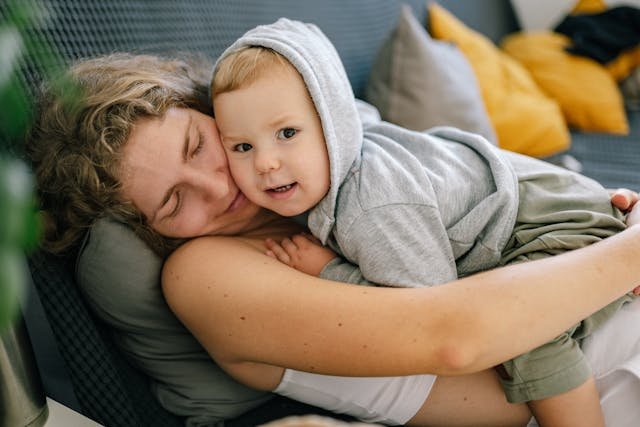Introduction:
The idea of mindful parenting has become well-known as a transforming strategy that prioritizes presence, awareness, and purposeful connection with your kid in the fast-paced and sometimes chaotic world of parenting. This parenting concept, which has its roots in mindfulness, promotes a thoughtful and caring approach to the parent-child bond. In this piece, we examine the fundamentals of mindful parenting and how it develops awareness and improves the relationship between parents and children.

Comprehending Mindful Parenting:
Being completely present and involved in the moment with your kid, without passing judgment, is the practice of mindful parenting. It takes its cues from mindfulness meditation practices, urging parents to develop an acute awareness of their feelings, ideas, and behaviors toward their kids.
Taking Hold of the Present:
Embracing the present moment is one of the core ideas of mindful parenting. Parents who practice mindfulness put more of an emphasis on being totally present with their kid in the here and now than they do on thinking back on previous transgressions or worrying about the future. In addition to fostering a greater awareness of the child’s needs and experiences, this builds a feeling of connection.
Developing Emotional Control
A key component of mindful parenting is learning how to control one’s emotions. Parents may react to their child’s needs with composure and empathy if they remain aware of their own emotions. In addition to serving as an example of appropriate conduct, this emotional control fosters a more gratifying and encouraging interaction between parents and children.
Improving Language Between Parents and Children:
The value of mindful communication is emphasized by mindful parenting. This entails paying attention to what your kid is saying, showing empathy, and making deliberate word choices. A setting where the kid feels heard and understood is fostered by effective communication, which also develops the parent-child relationship.
Encouragement of Self-Reflection

Self-reflection is prompted by mindful parenting, which asks parents to consider their own principles, responses, and triggers. Parents may foster a more harmonic and emotionally supportive home atmosphere by intentionally choosing how they connect with their children by being aware of their own emotional reactions.
Promoting Judgement-Free Awareness:
Cultivating nonjudgmental awareness is a fundamental component of mindfulness. This involves recognizing and embracing the difficult as well as the good parts of parenting without passing judgment or engaging in self-criticism. Parents are better able to react to events with more tolerance and compassion when they have this nonjudgmental knowledge.
Developing Thoughtful Rituals:
Creating attentive routines in everyday life is a common component of mindful parenting. These may be as easy as setting up a peaceful nighttime routine, practicing mindful breathing techniques, or having moments of thankfulness with others. These customs create a feeling of community and provide parents and kids the chance to interact mindfully.
Developing Compassion and Empathy:
A key component of mindful parenting is developing empathy and compassion for oneself as well as one’s kid. Parents may react empathetically to their kid and foster emotional stability by acknowledging and comprehending their feelings.
Harmonizing Clarity and Adaptability:
Parenting with mindfulness finds a balance between being flexible and imposing order. It entails establishing firm guidelines and expectations while being flexible to accommodate the child’s evolving needs and situation. This harmony fosters a healthy parent-child relationship and gives the youngster a feeling of security.
Practicing Mindfulness with Your Kids:
Children look up to parents who practice mindful parenting as strong role models. Youngsters pick up skills via observation, and if they see their parents practicing mindfulness, they are more likely to do the same, creating a generational circle of aware and attentive life.Developing Mindful Presence: Being present with your kid in the moment is a key component of mindful parenting. This is putting aside distractions like electronics or thoughts about work and making time to spend with your kid. By giving your whole attention to the here and now, you strengthen your relationship and create enduring memories with your kid.
Conscious Discipline:
Parenting requires discipline, and mindful discipline is reacting to your child’s actions with consideration and empathy. Mindful parents pause to examine the underlying feelings and intentions behind their child’s behavior rather than responding without thought. This method promotes collaboration and trust by enabling more compassionate and effective punishment.
Teaching Your Child to Be Mindful:
Mindful parenting entails sharing the advantages of mindfulness with your kid in addition to engaging in personal mindfulness practices. To assist your kid in developing their own mindfulness abilities, introduce them to age-appropriate mindfulness exercises like guided meditations or basic breathing techniques. Mutual understanding and a feeling of connection are fostered by this shared activity.
Handling Difficulties Mindfully:
There will definitely be difficulties as a parent, but mindful parenting gives you the skills you need to face these difficulties head-on. The practice of mindfulness enables parents to address challenges with a calm and collected mentality, promoting resilience in both parent and kid, whether confronting tantrums, disagreements, or uncertainty.

Bringing Mindfulness to Various Ages:
A mindful parent may adjust to their child’s evolving requirements at different phases of their growth. Techniques appropriate for a teenager may not be the same as ones that work for a toddler. Conscious parents are adaptable; they modify their strategy to suit the special qualities and difficulties that come with every developmental stage that their kid is going through.
Looking for Mindful Communities and Support:
Being a mindful parent doesn’t mean doing it alone. Join mindful parenting groups or look for assistance from other parents who share your values. By exchanging experiences, knowledge, and tools, you may improve your parenting abilities and your mindfulness practice by getting fresh ideas and supportive viewpoints.
Honoring Little Things:
Small, daily events should be celebrated, according to mindful parenting. Encouraging and relishing these little pleasures, whether they be laughing together, seeing a kid discover something, or just spending time together in silence, helps to foster a healthy and thoughtful parenting style.
How to Exercise Self-Compassion:
Being a mindful parent means having compassion for both yourself and your kid. Understand that being a parent is a journey with ups and downs, and that it’s OK to fall short of perfection. By engaging in self-compassion practices, you may approach the difficulties of parenting with empathy and compassion.
Considering Family Values:
Thinking about your family’s beliefs on a frequent basis and making sure your parenting style is in line with them are both parts of mindful parenting. This deliberate introspection assists you in making decisions that intentionally enhance your family’s general pleasure and well-being.
Sustaining the Introspective Path:
Being a mindful parent is a lifetime learning and development process. Accept that parenting is a journey, and as your kid grows, keep discovering new facets of mindfulness. Maintaining a regular practice of mindfulness improves parent-child relationships and fosters a loving, supportive home atmosphere.
To sum up, mindful parenting emphasizes a presence, awareness, and connection-based attitude and is a comprehensive approach that goes beyond particular strategies. By incorporating mindfulness into your parenting style, you may strengthen your relationship with your kid and create a peaceful and healthy family environment.
Common Questions (FAQ) – Conscientious Parenting
Mindful parenting: what is it?
In the parent-child interaction, mindful parenting places a strong emphasis on being totally present, conscious, and purposeful. It is based on the principles of mindfulness and entails raising your kid with awareness and compassion while developing a close bond.
What distinguishes mindful parenting from conventional parenting?
In contrast to conventional parenting, mindful parenting emphasizes purposeful connection with the child, nonjudgmental acceptance, and present-moment mindfulness. It entails using mindfulness exercises to improve the general wellbeing of the parent and the kid.
Which fundamental ideas underpin mindful parenting?
Embracing the present moment, developing emotional control, encouraging effective communication, building empathy and compassion, and engaging in non-judgmental awareness are some of the fundamental ideas of mindful parenting. These guidelines support thoughtful and fruitful parent-child interactions.
Is it possible for someone to parent mindfully?
Yes, anybody who is willing to practice intentionally and develop a mindful mentality may become a mindful parent. It may be adjusted to a variety of families and parenting philosophies since it is not constrained by parenting style, cultural background, or personal views.
What is the best way for me to begin mindful parenting?
Start by introducing mindful breathing exercises or purposeful moments of presence with your kid into your regular routine. Take mindfulness classes or read parenting books to expand your knowledge and acquire useful skills.
Is mindful parenting appropriate for kids of all ages?
Yes, mindful parenting may be adjusted to fit a child’s developmental stage. From infancy through puberty, the concepts and techniques may be modified to meet the needs and abilities of the kids, encouraging a kind and understanding parenting style.
Can discipline be aided by attentive parenting?
Yes, mindful discipline is reacting to a child’s actions with consideration and empathy. This is a component of mindful parenting. Parents who are aware of their child’s feelings and intentions may reprimand in a manner that fosters good conduct and is sympathetic.
What positive effects does mindful parenting have on the parent-child relationship?
Through encouraging honest communication, understanding, and emotional connection, mindful parenting strengthens the tie between parents and children. By practicing mindfulness, parents may build a foundation for a meaningful and profound connection with their kid by being totally present with them.
Is it time-consuming to parent mindfully?
It is possible to include mindful parenting into regular tasks without needing a substantial increase of time. You may easily include easy techniques like mindful breathing or being present for your kid throughout everyday activities into your parenting style.
Can parents experience less stress via mindful parenting?
Yes, lowering parental stress is one of the advantages of mindful parenting. Parents may feel more at ease and at peace with themselves by developing emotional regulation skills, engaging in mindfulness exercises, and confronting obstacles with a deliberate and calm attitude.
Recall that practicing mindful parenting is a process, and it’s OK to include mindfulness into your parenting style gradually. The secret is to commit to cultivating a conscious and connected connection with your kid and to accepting the concepts with an open heart.



